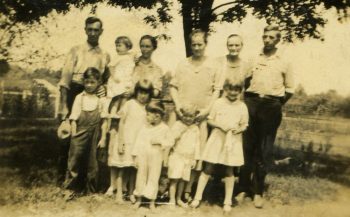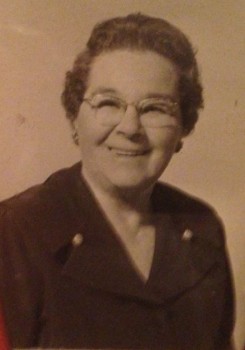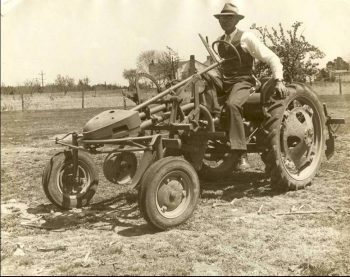Up on Silver Creek, the blackberry bushes grew taller on the east side of the hill. The dew came off them sooner and the berries enjoyed the sunlight for a longer time. The remains of an old orchard, planted by the first white settlers, shielded the fruit from the bluebirds.
“My mother would help my sister Kathryn and I pick a vessel full of berries, then she would start home to start a batch of jelly on the wood stove.” My old daddy, Brother Jack White, was recounting the times for me.
“We would pick two more big bowls without her, that she would add to the batch. Kathryn was three years older than me. Her arms were longer and she could really pick berries.”
Kat, also, was one of the most competitive humans I ever knew — whether it was berry picking, or later on playing golf. Her many trophies attest to this.
“Your grandmother was the hardest working woman I ever knew. She was all the time working in the garden or cooking or making quilts or making our clothes.”

Back row: Bob and Hattie White, with daughter Margaret Dee; Mary White, Katie Belle King White, Fred White. Front row: Tom, Kathryn, Jack, Doug, and Ann Louise White.
Until he was in the sixth grade, Jack wore shirts, pants, and even underwear made by his momma. Only his shoes came from a store — M. Ginsburg’s on the square in Lewisburg. In fact, it wasn’t until Jack was old enough to raise a tobacco crop and get serious with his trapping, that he started buying his whole wardrobe from Mr. Ginsburg.
By the way, one of my fondest memories is going to M. Ginsburg’s with my grandmother to buy Levi’s. The Levi’s were on the second floor balcony and I could look down to the main floor and observe my elderly grandmother in friendly conversation with her old friend, Mr. Myer Ginsburg. She remembered him from before he opened his store in 1919, when he was a peddler coming door-to-door with his wares to people in the country. There was always something comforting about watching these two recall old times — a country woman and a Russian-born merchant, two folks of different faiths, educational experiences, and cultures, who loved one another’s company.

My grandmother Hattie Mitchell White
When my dad was a boy, times were tough on the farm because of the Depression and my grandfather’s poor health. There came a time, when my dad was about to start the ninth grade, that my grandfather approached him and my dad’s youngest sister Margaret Dee with sad news.
“I’m afraid, I’m not going to be able to send both of you to school this year. You’re going to have to decide between the two of you who goes.”
I’ve written about this before but I’ve just learned another detail or two.
My dad was the top student at Bryant Station school, mostly due to the principal/teacher, Bill Orr. Mr. Orr took an interest in this hardworking little boy and threw a lot of responsibility toward him, knowing Jack always would master the task and, along the way, build confidence in himself (especially, since confidence was invested in him). One of the jobs handed Jack was driving the school bus, starting when he was thirteen years old and in the eighth grade.
Although he absolutely loved school, my father did not hesitate when approached with the dilemma.
After Margaret Dee began to cry, my dad told my grandfather, “You’ll not have to worry about sending me to school.”
What I have just learned is, that my grandfather’s brother Fred heard about the situation. Fred had lost a son to diabetes only a year before, his only son Doug, my dad’s best friend.
Fred drove a tractor to his brother’s farm to see my dad. He always called my dad “Jake.”

Fred White
“Jake, I heard about your problem, and I’m gonna send you to school.”
My dad looked at his uncle for a moment, then said, “I’m not going to let you do that, Uncle Fred. It’s my problem and I’ll handle it.”
And so he did, for a year. He used his tobacco and trapping money to pay for school but, when the tenth grade rolled around, he no longer could afford it.
My dad told me at 95 years of age, his saddest moment was seeing that school bus pull away from the farm with his sister and friends on it.
“I felt like a small acorn on a limb.”

